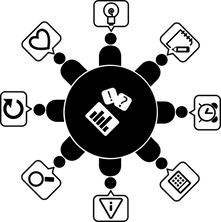English materials for
Secondary school in México
Secondary school in México
Second Grade
Unit 9
Lesson plan
Lesson plan | Videos | Worksheets & Handouts | PowerPoint presentations |
Exercises for students | Project Ideas | Pop Quizzes & Exams
Exercises for students | Project Ideas | Pop Quizzes & Exams
|
Introduction (15 mins.) T sticks some flashcards about controversial topics on the board and asks Ss to describe them. T draws a graphic organizer (mind map) on the board using the Ss’ ideas and thoughts. Ss take notes. Development (15 mins.) Ss label twelve controversial images. Consolidation (15 mins.) Ss watch short videos about controversial topics and identify the following information for each video: name of the problem, people involved and opinions. Conclusion (5 mins.) T reads the achievements for this unit and encourages Ss to share their ideas about the meaning of each achievement. Ss say their expectations they have of the unit. Homework: Ss research information about controversial topics. Ss have to choose a problem they are concerned and write the following information required: name of the problem, people involved and opinions. They may include illustrations. Introduction (5 mins.) T asks Ss to compete naming as many sources of information as they can. Development (15 mins.) Ss label twelve sources of information. Consolidation (20 mins.) T reads aloud some uses of five sources of information and asks Ss to identify them. 1. To read articles and popular opinions. 2. To share information from any place in the world. 3. To learn a collection of facts and methods about a certain subject. It's printed on pages bound together. 4. To check the spelling of words. 5. To assess thoughts, opinions and feelings about a topic from a sample of people. Answers: 1. Newspaper or magazines. 2. Internet. 3. Books. 4. Dictionary. 5. Survey. T puts Ss into pairs and asks them to choose an controversial topic and write what they would like to know about it. So, Ss make a list of questions and suggest souces of information to answer each question. Closure (10 mins.) Volunteers come to the front of the class and share their questions and the sources of information they would use. |
|
|
Academic rally (not physical interaction)
Here are the stages: Stage1 – Components of sources of information. Stage 2 – Completing definitions. Stage 3 – Matching controversial facts and images. Stage 4 – Questions and answers. Introduction (10 mins.) T asks Ss what they know about abortion.
T asks Ss to read a text about abortion. After that, Ss identify the causes and effects. Consolidation (20 mins.) In pairs, Ss match causes and effects from a list of problems: dogfighting, human trafficking, global climate change, fear of vaccines and death penalty. Ss choose another problem and describe its causes and effects. Closure (5 mins.) T encourages Ss to explain the relevance of taking actions to prevent problems. T explains to Ss that some bad decision can change their life or hurt people they love. |
|
|
Introduction (10 mins.) T asks Ss to name adjectives that they would use to give opinions. For example: bad, wrong, correct, terrible, awful, dangerous, funny, interesting, boring, difficult, great, disgusting and addictive. Development (10 mins.) Ss complete a worksheet using adjectives. Consolidation (15 mins.) Ss complete a worksheet with opinions. Closure (15 mins.) In pairs, Ss make a short conversation to ask and give opinions using the expressions that they have learned. Introduction (10 mins.) T explains to Ss that they are going to listen to four statements, and decide if they agree or disagree. Statements:
T gives Ss examples of agreement and disagreement expressions such as: I agree/disagree, I'm (not) with you, I (don't) think so, etc. T gives examples of short conversations to practice these expressions. Consolidation (15 mins.) In pairs, Ss practice orally the conversation. Closure (5 mins.) T provides positive feedback and reinforcement. |
|
|
In teams, Ss suggest and discuss different controversial topics. Ss write a set of questions to begin with their research. Ss select sources of information for their topic. Ss organize and divide the topic equally. Ss have to identify and write down the causes and effects of the problem. Ss write statements to express points of view using expressions like: I think that, I believe that, In my opinion, etc. Ss write a list of questions to discuss in the roundtable. Ss assign roles: moderator, secretary and speakers. Ss organize turn-taking shifts and length of speeches for each member. Have a roundtable discussion and reach a conclusion. |
|

